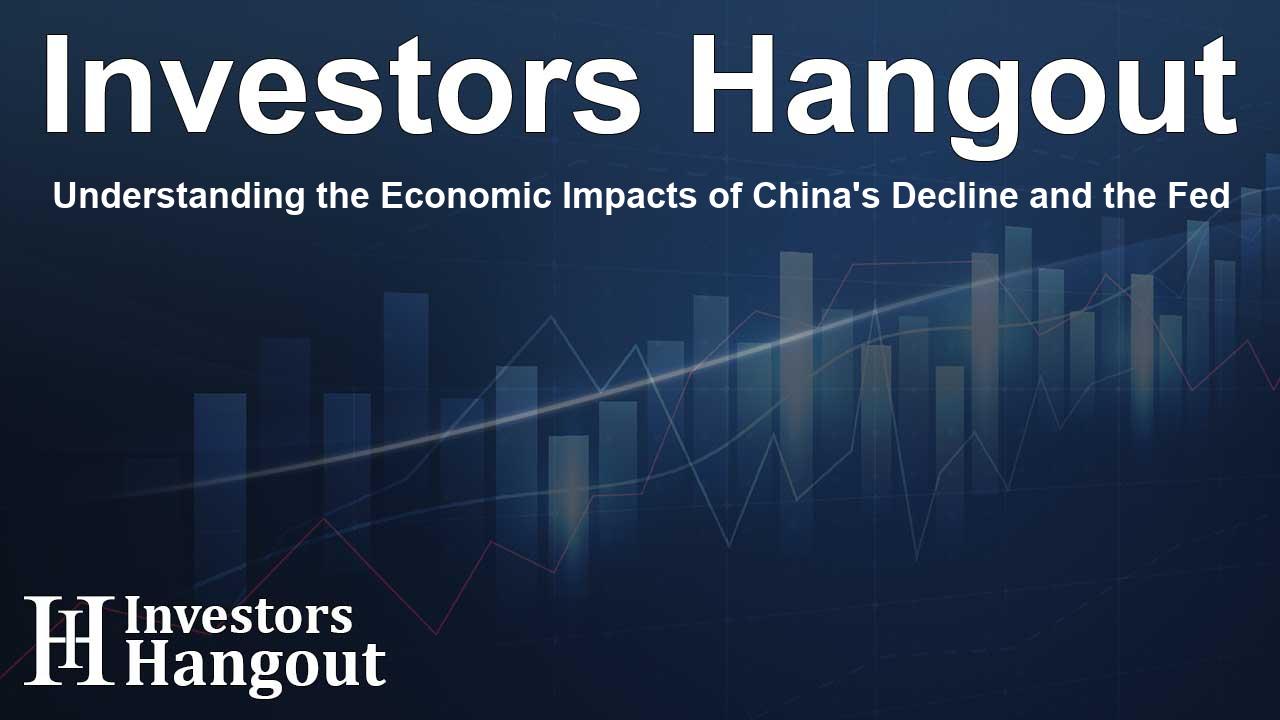Understanding the Economic Impacts of China's Decline and the Fed

The Global Significance of China's Economic Challenges
The recent headlines have been dominated by various economic developments, but an often overlooked yet pressing issue is the ongoing decline of the Chinese economy.
This situation is one we should all pay close attention to.
The Declining Property Market in China
Data reveals that the Property Price Index for first-tier Chinese cities is hitting new lows, reminiscent of conditions seen years ago.
In most scenarios, a dip in house prices might not cause panic, but the ramifications in China are far more serious.
The Weight of Real Estate on Chinese Households
More than 60% of the wealth of Chinese families is tied to real estate, significantly higher than the 23% recorded in the United States, where investments in the stock market and retirement plans dominate.
Picture your own stock portfolio reverting to levels from several years ago—this is the kind of anxiety gripping many Chinese households today.
Reasons Behind China's Economic Deterioration
The current situation stems in part from Xi Jinping's attempts to create a new model of "common prosperity," aimed at reducing reliance on leverage and inflated asset prices, shifting focus toward boosting domestic consumption instead.
However, the challenge lies in navigating a vast real estate market that has been extensively leveraged.
As the Chinese government cuts interest rates, hoping to stave off a recession, the proactive measures appear to fall short of addressing the fundamental instability in the property market.
To illustrate the severity, the 10-year interest rates in China have plummeted below 2% for the first time ever, yet this tactic alone lacks the efficacy in combating the ongoing deleveraging cycle.
The Broader Implications of China's Economic State
China's economic turbulence is particularly alarming due to its significant role in global trade, being a primary trading partner for numerous countries.
Countries reliant on exporting to China, like Brazil, could see direct impacts from this economic unraveling.
While many focus their attention on the Federal Reserve and its policies, it's crucial to recognize that China represents a key macroeconomic influencer that deserves equal scrutiny.
The recent interest rate cut by the Fed may have been celebrated across markets, yet we must remember that such monetary measures must align with tangible economic conditions.
Analyzing the Fed's Recent Actions
With the Fed Funds rate at 4.75%, the implications depend heavily on whether the U.S. economy is performing robustly or stalling.
A nuanced evaluation indicates that the monetary policy's implications aren't straightforward; they need careful consideration against the backdrop of current economic trends.
The Critical Balance of Policies and Economic Health
The relationship between Fed Funds and the underlying growth indicators is key. Recent analyses suggest that maintaining Fed Funds levels close to or above the growth proxy signals potential trouble ahead.
It’s evident that more decisive action from the Fed is necessary.
Otherwise, we risk achieving complacency while the economic landscape shifts beneath us.
Final Thoughts on Economic Monitoring
Amidst all the discourse surrounding macroeconomic developments, it is crucial to stay informed about the intertwining challenges of both China and the Federal Reserve.
As we navigate through complex economic issues, remaining vigilant and seeking clarity will help us understand the broader consequences that could ripple through global markets.
Frequently Asked Questions
What are the main economic issues facing China currently?
The major issues include a declining property market, high household wealth in real estate, and shifts towards a new economic model focused on internal consumption.
How does China's economic situation affect other countries?
China is a significant trade partner, and its economic challenges can disrupt trade relations and impact countries reliant on exporting to China, such as Brazil.
What is 'common prosperity' in the context of Xi Jinping's policies?
Common prosperity refers to an economic model aimed at reducing leverage and fostering greater equitable wealth distribution in China.
Why is the Fed's monetary policy significant right now?
The Fed's policies impact interest rates and overall economic conditions in the United States, influencing global economic dynamics.
What can we expect moving forward from both China and the Fed?
Both will require careful monitoring as their actions will significantly impact economic stability both locally and globally.
About Investors Hangout
Investors Hangout is a leading online stock forum for financial discussion and learning, offering a wide range of free tools and resources. It draws in traders of all levels, who exchange market knowledge, investigate trading tactics, and keep an eye on industry developments in real time. Featuring financial articles, stock message boards, quotes, charts, company profiles, and live news updates. Through cooperative learning and a wealth of informational resources, it helps users from novices creating their first portfolios to experts honing their techniques. Join Investors Hangout today: https://investorshangout.com/
Disclaimer: The content of this article is solely for general informational purposes only; it does not represent legal, financial, or investment advice. Investors Hangout does not offer financial advice; the author is not a licensed financial advisor. Consult a qualified advisor before making any financial or investment decisions based on this article. The author's interpretation of publicly available data shapes the opinions presented here; as a result, they should not be taken as advice to purchase, sell, or hold any securities mentioned or any other investments. The author does not guarantee the accuracy, completeness, or timeliness of any material, providing it "as is." Information and market conditions may change; past performance is not indicative of future outcomes. If any of the material offered here is inaccurate, please contact us for corrections.